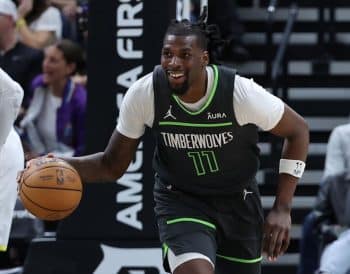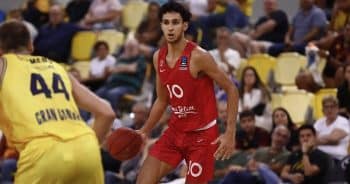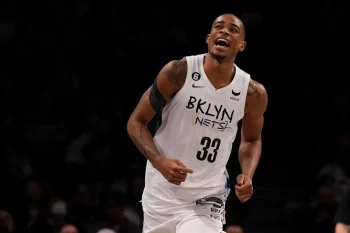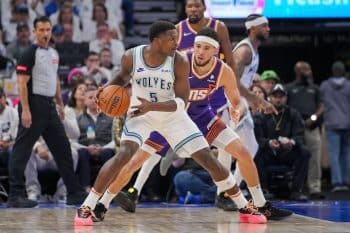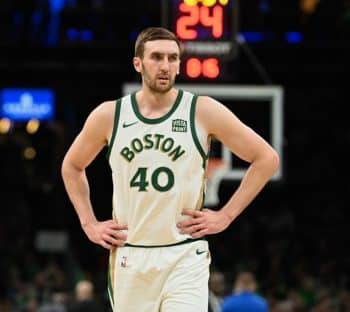NBA
Charlotte Hornets 2019-20 NBA Season Preview

A new era has finally dawned for the Charlotte Hornets. Facing another half-decade of sustained mediocrity, Michael Jordan and Mitch Kupchak elected against re-signing the beloved Kemba Walker, giving the Hornets a much-needed reset but ridding the roster of the only player who ever really propelled them to success.
The rebuild, for the long-term better and short-term worse, is here. But the track it follows will largely depend on the development of several young players, any of whom it’s easy to envision ultimately coming into their own elsewhere. Especially if you are placing wagers at betfred or one of the Best Sportsbooks in the US.
Will this season mark the infancy of Charlotte’s next playoff team, or merely serve as year one of a lengthy, laborious process that ultimately takes multiple forms? Either way, the Hornets won’t be winning many games in 2019-20, a blueprint toward future contention this franchise unfurled a bit later than it should have.
FIVE GUYS THINK…
The 2019-20 season looks bleak for the Hornets. They passed on extending Kemba Walker, and swapped him for Terry Rozier. There are lots of overpaid players on the roster like Nic Batum and Marvin Williams, and some unproven younger ones like Malik Monk. The few bright spots on the Hornets roster appear to be Miles Bridges and rookie P.J. Washington – and maybe Rozier depending on how you define a bright spot. The Hornets flirted with the playoffs for a few years – even qualifying in 2016. That won’t be the case this season.
5th Place – Southeast Division
– Drew Maresca
To say the Hornets had a poor offseason would be kind of an understatement. Not only did they lose franchise cornerstone Kemba Walker, they didn’t really do anything to pick a firm direction they want to go in. With Walker gone, a rebuild seems to be the best option moving forward, but they kept all of their high-priced veterans around. Of course, it could be that there isn’t a market for any of them. After all, a team needs to be willing to trade for those players/contracts. The signing of Terry Rozier is a bit of a head-scratcher, as they gave him quite a bit of money for a player that isn’t of Walker’s caliber but is expected to replace him. The one thing they may have going for them though is some of their youth. Miles Bridges, Malik Monk, Dwayne Bacon and P.J. Washington are a start. Not a very confidence-inspiring start, but a start nonetheless. Expect the losses to pile up for the Hornets this season.
5th Place – Southeast Division
– David Yapkowitz
For the first season since 2011, the city of Charlotte will not have Kemba Walker suit up on opening night. It’s never easy losing a star player, but this one especially hurts. There’s a question of who will be the one to step up. What the question should be is who will be the *ones* to step up. You can’t replace somebody like that with one player. Terry Rozier can have a career season, and he’s bound too, yet it’ll still take a collective effort and strong performances all around to keep this group afloat. Miles Bridges will have to grow up fast. The same could be said of Dwayne Bacon, Malik Monk and even rookie forward P.J. Washington. The mental toughness of the Hornets will be tested this season and the near future. How James Borrego handles this type of adversity will be paramount to the team’s direction.
5th Place – Southeast Division
– Spencer Davies
It’s hard to understand what Charlotte’s goal was going into this offseason and what the long-term vision is at this point. First, if the Hornets were not going to offer Kemba Walker a max contract, then they should have traded him before he hit free agency. Charlotte hasn’t been anywhere close to contention in recent seasons and should have foreseen Walker moving on if the team was not going to offer a max contract. Second, in response to Walker opting to move on, the Hornets engaged in a sign-and-trade with the Boston Celtics, sending Walker and a 2020 second-rounder to in exchange for Terry Rozier on a new three-year, $56,700,000 contract. That is a lot of money for Rozier who is talented, but is unlikely to live up to this contract. Third, they let Jeremy Lamb go to the Indiana Pacers for what turned out to be a very reasonable contract (three-year, $31.5 million). Lastly, I’m just not a big fan of what the Hornets did in the draft. A few years down the road, it may turn out that P.J. Washington (12th), Cody Martin (36th) and Jalen McDaniels (52nd) were all good selections for Charlotte, but I am not counting on that. Its just difficult to see what the strategy is here for the Hornets and it’s hard to get past how big of a mistake it was to not trade Walker when he was still under contract for young talent and future assets.
5th Place – Southeast Division
– Jesse Blancarte
The Charlotte Hornets are a team poised for a re-build, although one could argue that if anyone on the roster steps up to an All-Star level things could get interesting in Charlotte. In fact, the Hornets are returning a lot of the same core that won 39 games last year. It’s clear there is no one on the roster of former Hornets star Kemba Walker’s stature, but if a combination of guys step up or have the expected internal growth, they could be better than most seem to be thinking. That said, the Hornets still look like a team more likely to lose 50 games than win 50, which will put them in the lottery and likely sellers of any meaningful veterans they have on the roster come the trade deadline in February. James Borrego is a quality coach – it is just unfortunate that he’ll have to skipper another roster thats not likely to be playing for much at the end of the season.
5th Place – Southeast Division
– Steve Kyler
FROM THE CAP GUY
When Kemba Walker chose the Boston Celtics, the Hornets opted to facilitate a double sign-and-trade transaction landing Terry Rozier on a three-year $56.7 million contract. That move locked in a hard cap for Charlotte, limiting the team to $138.9 million in total salary. That shouldn’t be an issue, the team will likely enter the season with a payroll at roughly $125 million.
If needed, the Hornets still have $8.1 million of their Mid-Level Exception remaining (partially used on Cody Martin) and their full $3.6 million Bi-Annual Exception. But don’t expect the franchise to exceed the $132.6 million luxury tax threshold, let alone reach the hard cap.
Before November, Charlotte needs to decide on the team options for Malik Monk and Miles Bridges.
– Eric Pincus
TOP OF THE LIST
Top Offensive Player: Nicolas Batum
As much as anything else, Batum’s status as Charlotte’s best offensive player is an indicator of just how lacking this roster is for talent compared to the rest of the NBA. He was always overstretched as the Hornets’ secondary scorer and playmaker under Steve Clifford, and indeed seemed more comfortable last season after first-year coach James Borrego shifted him down to small forward, allowing the veteran to play a more ancillary offensive role as he entered his thirties.
Batum bumped his true shooting percentage comfortably above league average for the first time in six years, sacrificing mid-range jumpers for threes and making a career-best 39.4 percent of his catch-and-shoot triples, per NBA.com. Both his usage percentage and amount of touches dipped considerably, while his share of assisted baskets ticked all the way up to 67.2 percent – far higher than in any of his previous four seasons with the Hornets.
As a jack of all trades and master of none, this is the role for which Batum has long been best suited. The problem is the value of dependent offensive players, especially one with natural court sense like Batum, correlates to the quality of their teammates, and no team in the league is in more dire need of a talent influx offensively than Charlotte.
Top Defensive Player: Michael Kidd-Gilchrist
Kidd-Gilchrist was another benefactor of Borrego embracing a more modern style of lineup construction last season. Finally playing the right position, power forward, he re-established himself as an ultra-versatile difference-maker defensively.
Kidd-Gilchrist led the Hornets in both defensive rating and net defensive rating, per NBA.com, evidenced by his ability to switch across four and sometimes five positions. He was Charlotte’s only player other than Cody Zeller with a defensive real plus-minus above 1.0, and held offensive players to a lower field goal percentage than expected from everywhere on the floor, too.
Dreams of the former No. 2 overall pick becoming a positive player on the other side of the ball are long gone, and a relative deficiency in short-area quickness has kept him from fulfilling expectations as a stopper of historic order. But Kidd-Gilchrist has natural defensive instincts and always competes, while his effectiveness holding up at power forward – occasionally even small-ball center, too – unlocks crucial flexibility for the Hornets they would otherwise lack.
Top Playmaker: Terry Rozier
Michael Jordan and Mitch Kupchak have placed a lot of faith in Kemba Walker’s replacement – too much, in fact, by almost any measure. It’s unclear who Charlotte was bidding against when it offered Rozier a three-year, $58 million deal in free agency, ultimately acquiring him from the Boston Celtics via sign-and-trade. But unless he shows far more capacity as a floor general with the Hornets than he ever did with the Boston Celtics, Rozier is poised to disappoint – and hamstring his new team’s arduous rebuilding efforts.
It’s unclear how Borrego will tweak an offense that last season used more ball screens than any team in the league but the LA Clippers, per NBA.com, but he’ll have to with Rozier in Walker’s place. Charlotte’s new franchise point guard is more accurately described as a ball-handler than playmaker. He lacks high-level passing vision, and doesn’t threaten the defense enough by attacking the rim or with his pull-up jumper to create the space needed to consistently compensate for that weakness.
The Hornets need a point guard who can make his teammates better if he can’t drive them to success by himself, and neither description fits Rozier based on his career to date. But he’s also the only guard on this roster with the physical tools and eroding potential to play either role should he suddenly take a major step forward.
“Offensively, I’ve got to get him more comfortable right now in our system,” Borrego said of Rozier, per Rick Bonnell of The Charlotte Observer. “He’s got a lot to prove — the first time he’s out there as a starting point guard.”
The viability of Charlotte’s offense won’t hinge on Rozier nearly as much as it did Walker, but unless he shows court sense and an ability to manipulate the defense that he’s yet to thus far in his career, the responsibilities he’ll be asked to shoulder will almost certainly prove too heavy regardless.
Top Clutch Player: Malik Monk
Monk has virtually no track record of crunch-time success in the NBA. He took 15 shots in those situations last season, making five of them, and was on the court for less than a third of Charlotte’s 158 minutes in the clutch, per NBA.com. Needless to say, thats not exactly the resumé of a player normally tasked with serving as his team’s alpha dog when it matters most.
But Monk could fit that bill this season anyway for the Hornets, who are otherwise bereft of the shot-making talent necessary to score under the pressure cooker of crunch time. Rozier, even considering the overblown hype of “Scary Terry” in the 2018 playoffs, isn’t a reliable enough off-dribble shooter. Batum just isn’t that type of player. Miles Bridges definitely isn’t ready to be Charlotte’s top offensive option when the game is on the line, and likely never will be.
That leaves Monk, whose blend of explosive athleticism, wiggle with the ball and flammable scoring skills has long prompted Lou Williams comparisons. The problem? Monk’s ability to drain difficult pull-up jumpers is mostly theoretical at this point, and he doesn’t navigate ball screens with enough knack and subtlety to crease the paint when defenses dare him to shoot. Just like the Hornets, he’s still very much still a work in progress – which is all the more reason why they should force-feed Monk touches in the clutch to help figure out how he fits in the organization’s big-picture plans.
The Unheralded Player: Cody Zeller
Death, taxes and Charlotte faring better when Zeller is on the floor. Ever since his rookie year in 2013-14, the Hornets have put up a positive net rating with Zeller in the lineup. Last season, the six-year veteran was the only player on his team to notch an on-court rating better than 1.0, per NBA.com.
Zeller’s influence comes in the margins. He racked up screen assists at a rate higher than any other player in the league, evidence of his speed running into picks and comfort flipping the angle and direction of screens at a moment’s notice. He’s adept in the dribble hand-off game, too, and creates several easy scoring opportunities per game for his teammates simply by sprinting the floor in transition and diving hard to the rim, sucking in defenders. Zeller’s short arms limit him as a rim-protector, but he’s almost always in the right position, using his instincts and quickness to routinely cover for teammates.
Unfortunately, a penchant for injury has prevented Zeller from staking his claim as one of basketball’s best role-playing bigs. He’s played a total 82 games over the past two seasons due to knee and hand injuries, and has appeared in more than 62 games just twice in his six-year career.
Best New Addition: P.J. Washington
Washington isn’t sexy.
He has good physical tools for a power forward, with impressive quickness and overall coordination, and possesses more than enough length and strength to play small-ball five. He shot 42.3 percent on over two three-point attempts per game at Kentucky last season, the most significant of across-the-board improvements made compared to his freshman campaign.
The rough outline of a productive NBA player is here. But unless Washington gleans a much better understanding of how to play when he’s not involved in the primary action on both sides of the ball, it seems likely his decided dearth of natural instincts will keep him from reaching his potential as a switch-proof big man with nascent three-point range who can put the ball on the floor in space.
Washington’s selection here, like most, says more bad things about the Hornets than it does good things about him. Charlotte punted on free agency other than Rozier, whose contract is one of the summer’s most head-scratching, and has no plans to change that approach going forward as it transitions to life without Walker.
“Free-agent signings, for us, are not something we need to concentrate on going forward. We’re not going to get the ‘Big Fish,’” Kupchak said, per The Observer. “We have to create a culture where those kinds of players would want to come here. And, quite frankly, we’re not there yet.”
– Jack Winter
WHO WE LIKE
1. Charlotte Finally Embracing The Future
Even during this organization’s most successful seasons under Clifford, there was a clear cap on just how high the Hornets could rise in the Eastern Conference. A team with Walker as its best player, as dynamic as he is on the floor and inspiring he is off it, was just never going anywhere meaningful. In that vein, moving on from the homegrown star made sense for the Hornets.
What didn’t, and is fully deserving of the widespread criticism it sparked, was Kupchak insisting Charlotte would do “everything” possible to re-sign Walker in free agency, only to extend him a a five-year, $160 million final offer that fell well below the max. Kupchak’s recent concession that the Hornets’ plans were complicated by Walker making Third Team All-NBA, thus qualifying for the super-max, doesn’t make the optics any better.
Regardless, staying the course was never the best plan for Charlotte, as difficult as the circumstances surrounding Walker’s departure were. There’s no telling where this team ultimately goes from here, and it will almost surely be a bottom-dweller in the standings this season. But the mere prospect of real contention going forward – way forward, to be clear – is a more hopeful position than the Hornets have been in since 2016.
2. Dwayne Bacon
Playing in Charlotte could cost Bacon a lot of money this summer. There aren’t many 6-foot-7 wings with workable athleticism, a plus wingspan, thick shoulders and fledgling three-point range who could remain relatively anonymous in league circles, especially just one season ahead of restricted free agency. But that reality applies to Bacon as 2019-20 approaches, and unless his development continues at the accelerated rate it did last season, could save the Hornets some cash next summer.
Bacon’s impact as a rookie in 2017-18 was almost impossible to distinguish. He’s not quite good enough defensively to be considered a true stopper, and isn’t disruptive enough on that end that his presence alone makes a positive difference. But coupled with an adjusted shot chart that prioritized the rim and the arc – where he shot 69.4 percent and 43.7 percent, respectively, last season – Bacon’s utility as a solid, versatile, scheme-sound defender takes on a whole new level of value.
One caveat: Bacon’s newfound prowess from deep came on just two tries per game, and he shot only 25.2 percent in the G-League last season, albeit on a much more aggressive diet of attempts than he’ll ever need in the NBA. He definitely isn’t the marksman his three-point shooting percentage from last season indicates, basically. But if Bacon proves himself a player who must be guarded beyond the arc in 2019-20, a substantial payday likely awaits, one that could cement him as a viable rotation player for years to come.
3. Devonte’ Graham
Every team needs a reserve guard who can competently run the offense, make the defense pay when given air space from beyond the arc and compete defensively. Graham, a second-round pick in last year’s draft, has the makings of not just fulfilling that archetype, but potentially overgrowing it.
No numbers from Graham’s rookie season suggest either possibility is imminent. He shot 34.3 percent overall and 28.1 percent from deep, and posted the worst on-court rating of any player on the roster othan than Bismack Biyombo. Equally discouraging? An average leaper with a still-developing floater game, Graham shot 37.5 percent on drives, per NBA.com – fifth-lowest in the league.
Ignore specific takeaways from those damning statistics for now. Graham has just enough size to be used in two point-guard lineups and plays with a natural sense of pace, effectively changing speeds to get where he wants to go. Most optimism about Graham, though, stems from his fearless nature at Las Vegas Summer League, where he took nearly nine threes per game – with many coming off the bounce – and hit them at a 38.5 percent clip.
Graham won’t ever be a star, and very likely nothing more than a spot starter. But the league could always use more tough, smart guards who will take and make tough shots to sop up minutes behind stars, a role it’s easy to imagine him eventually playing at a worthwhile level.
4. Miles Bridges
The Bridges hype, even to the understated extent it exists, seems a bit overblown. He has average length for his position, and he lacks the hip fluidity needed to consistently keep up with dynamic ball handlers or even elite off-ball shooters after switches. He won’t ever be anything approaching a primary option offensively, but his shot-put stroke doesn’t suggest he’ll ever be a knockdown three-point shooter, either.
Even if Bridges reaches a more modest appraisal of his ceiling, it seems pretty clear he’ll fall short of being an All-Star. There’s nothing wrong with that, of course. But his jaw-dropping vertical oomph, rare aerial body control and passing-glance positional versatility has led some to believe he has legitimate star potential, and there was little to indicate as much during his rookie season save for so many highlight-reel finishes.
Still, the Hornets’ clearest path back to respectability involves Bridges establishing himself as a pillar of their rebuild – even if that means he’s ultimately more impact role player than secondary star.
– Jack Winter
STRENGTHS
Charlotte is finally playing the long game. The roster obviously isn’t where it needs to be in terms of overall talent, but the Hornets will at least employ a style this season that should position them well for rapid growth when the necessary pieces are in place.
That’s reflected in several aspects of Borrego’s overall philosophy: a preference for playing two ball handlers, his pointed decision to slide several players down a position and an offensive scheme that prioritizes space and quick-hitting ball movement. Though the Hornets aren’t the Moneyball Houston Rockets, the early takeaways of Borrego’s style indicate they’ll rely on modern offensive tenets now and going forward.
A more tangible immediate strength is Charlotte’s defensive flexibility. Kidd-Gilchrist, Marvin Williams, Batum, Bacon and Bridges can all guard three or more positions, and Borrego took semi-frequent advantage in 2018-19 by yanking all traditional bigs off the floor. Defense will be the source of the Hornets’ success this season far more often than offense; their enviable lineup and stylistic versatility should be the biggest reason why.
– Jack Winter
WEAKNESSES
Most teams have multiple players they have reason to feel confident in as lead ball handlers. Charlotte, depending on how you feel about Rozier, may not have any. More debilitating might be its shortage of players who can create unscripted offense for themselves and their teammates.
Bottom line: The Hornets have the worst collection of offensive talent in the league, and it’s not particularly close. Even if young players eventually scrape their realistic ceilings, they’ll still need to add multiple prospects with high-level offensive upside to be playoff-caliber on that side of the ball in the future.
– Jack Winter
THE BURNING QUESTION
Is there a surefire long-term building block on this roster?
In an illuminating interview with The Observer that finally ended their silence in the wake of Walker’s departure, Kupchack and Borrego full-throatedly endorsed a youth movement. Stalwart veterans like Batum and Williams will have their playing time cut to make room for younger players; even Kidd-Gilchrist, just 25, will likely fall prey to that stark shift in organizational priorities.
An unabashed rebuild has been long-awaited in Charlotte. The issue is that it’s unclear which of these incumbents will be able to show enough to have seen it through to the finish.
Even believers in Rozier know he won’t top out as anything more than a league-average starter. Monk’s high-outcome destiny as a microwave scorer is tantalizing, but accompanied by inherent questions of roster fit and cap resources. Bridges projects as an elite role player at best, and so does Washington.
The Hornets have ample time to find the star power they need to ultimately contend. Kupchak will be picking near the top of the lottery for the foreseeable future, and the seemingly imminent firesale of veterans midseason – in February 2020 or 2021 – will further stock Charlotte’s stable of draft assets. But holdovers from the Walker era aren’t good enough by themselves to foster a healthy environment of growth, and top-five picks won’t serve as that immediate panacea, either.
As the Hornets lose game after game, many by double digits, how are Rozier, Monk, Bridges and Washington supposed to make an inarguable case as cogs of this franchise’s long-term prospects? The more damning question for Charlotte’s future is whether or not they’d even be able to under more stable and rewarding circumstances.
– Jack Winter
